Congress Busts Carbon Budget
Air Date: Week of July 11, 2025
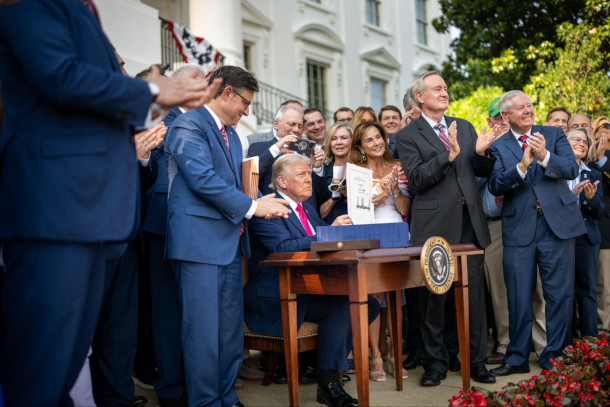
President Trump signed the budget bill into law on July 4, 2025. (Photo: The White House, Wikimedia Commons, Public Domain)
As the climate crisis brings ever more devastating floods, storms, heat waves and fires, the Republican-led Congress has slashed around half a trillion dollars in clean energy tax credits that would have reduced climate pollution and helped America to better adapt to climate change. Executive Editor Vernon Loeb and Washington Bureau Chief Marianne Lavelle of our media partner Inside Climate News join Hosts Steve Curwood and Aynsley O’Neill to survey the likely consequences for the climate, environment, and our democracy.
Transcript
O’NEILL: From PRX and the Jennifer and Ted Stanley Studios at the University of Massachusetts, Boston, this is Living on Earth. I’m Aynsley O’Neill.
CURWOOD: And I’m Steve Curwood.
As the climate crisis brings ever more devastating floods, storms, heat waves, and fires, the Republican-led Congress has slashed around half a trillion dollars in clean energy tax credits that would have reduced climate pollution and helped America to better adapt to climate change. At the same time, the massive bill signed into law on July 4th boosted spending for immigration enforcement and the military, while keeping tax cuts for the wealthiest Americans that were set to expire in December, and also shrinking food assistance and health care for the less fortunate.
O’NEILL: So, at the same time that it directly balloons the nation’s debt by trillions of dollars, the law also wipes away key investments that would have averted some of the skyrocketing costs of dealing with worsening climate impacts. Just in 2024, AccuWeather estimated storms that made landfall in the United States caused as much as $500 billion in damages and economic losses. And that’s just the money. The dislocations and loss of life from storms like Hurricane Helene and the recent catastrophic flooding in Texas also take major emotional tolls.
CURWOOD: We’re joined now by Vernon Loeb, Executive Editor of our media partner Inside Climate News and their Washington Bureau Chief Marianne Lavelle. Welcome back to Living on Earth!
LOEB: Thanks for having me. It's great to be here.
LAVELLE: Good to be here.
CURWOOD: So Marianne and Vernon, a whole lot has been packed into this one law, but in broad strokes, what's really changing here for the climate and energy and environmental sector? Marianne, maybe you could walk us through some of the basics.
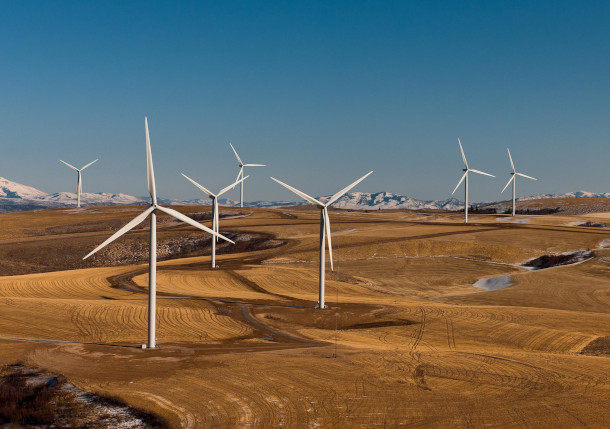
The law rolls back $500 billion of Biden-era tax credits for clean energy like wind and solar. (Photo: energy.gov, Wikimedia Commons, public domain)
LAVELLE: Yes, this really eliminates the historic investment in clean energy that Congress made only three years ago. No more tax credits for buying an electric vehicle or an efficient heat pump or solar panels for your house. No more tax incentives for energy efficiency improvements and then there is probably the biggest rollback, which is phasing out the tax credits for wind and solar energy. That's going to happen under a very aggressive timeline. The bill, at the same time, is opening up federal land and water for oil and gas drilling. It increases the profitability of oil and gas drilling on federal land, and it even creates a new subsidy, basically, for coal. Alongside of all of these other things, it really ends what was a historic investment in the poor and minority communities that bear a disproportionate pollution burden, and that was money the Trump administration was already refusing to spend. Congress has wiped it out completely.
O'NEILL: Vernon, I want to get your take on to what extent these changes align with President Trump's campaign promises. You know, what is the future of US energy looking like under a second Trump administration?
LOEB: They align pretty well with his campaign promises in that he was very clear about wanting to “drill baby drill,” very aligned with the fossil fuel industry during the campaign, and certainly that's the net effect of this bill. The American Petroleum Institute heralded the bill as bringing about a new era of energy dominance in America. In fact, I think it does quite the opposite. It syncs us up with old, dirty energy, and basically rolls back clean energy in America, wind, solar, EVs. It's really bringing about a new era of energy dominance for China, I think, is what it's actually doing.
O'NEILL: Well and this law is also going to be dealing a major blow to environmental justice, even beyond some of the executive orders we saw earlier this year which reversed federal EJ initiatives and shut down a number of EJ offices. So what is at stake for environmental justice communities here, Marianne, with the passage of this?
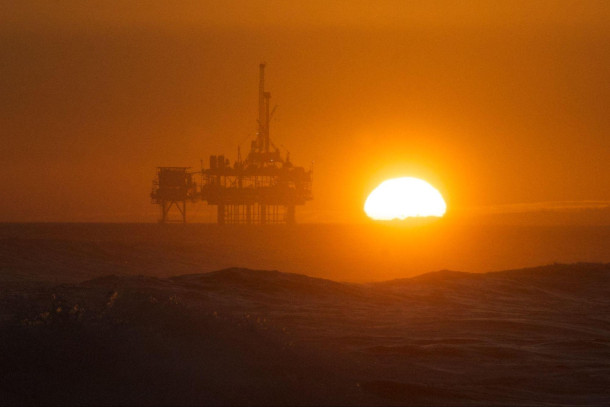
President Trump promised to “drill, baby, drill” during his campaign for the 2024 presidency. (Photo: Peter J Markham, Wikimedia Commons, CC BY-SA 2.0)
LAVELLE: I think you have to look at it as it's devastating for environmental justice communities, but probably for all of us, because these communities are the ones who are closest to the polluting factories, the polluting refineries, and that pollution doesn't stay in those communities. So the Biden administration and Congress had invested a lot of money in addressing some of the long standing pollution concerns in these communities, and that all has been rescinded. The Trump administration was indeed in court for the last few weeks saying they have a right to undo the contracts that were signed with all of these nonprofits and community groups and really with states and local government as well. Now this kind of gives them a backstop, no matter what happens with those court cases that are slowly winding their way through the federal court system, they can say Congress has rescinded all of this money and doesn't want to spend money the way the Biden administration wanted to.
CURWOOD: As you point out, the EJ communities are subject to the worst. But this approach would say, let's say we're talking about canaries in a coal mine. This would say that, well, you know, the canaries are in a special case, just because they're getting hit first by the noxious gas coming out of the coal mine and dying, we should pay no attention to their concerns, because there's no risk for the rest of us. I mean, that seems to be what they're saying about EJ communities. And Marianne, on this clawing back this money, these were signed contracts that were done. I mean, to what extent can the federal government legally and will the courts tolerate ripping up a contract that's been executed? I mean, doesn't our whole commercial economy run on the fact that contracts are enforceable?
LAVELLE: You could make the argument that that has been one of the hallmarks of the US economy, why the US has been such a wealthy country, because a contract is a contract here, and if the federal government is going to be allowed to break contracts, then everybody in the corporate community will feel they can follow suit. It really is a very new and disturbing direction for not only the environmental justice and clean energy community, but for the business community at large.
LOEB: And I might add that the grounds on which these contracts were broken were extraordinary. Trump basically ended the environmental justice grants on the grounds that they were illegal DEI programs. And in fact, environmental justice is something completely separate and apart from DEI, and environmental justice communities have been harmed disproportionately by our environmental policy, by pollution for decades, and these grants were the beginning of a sort of down payment on those harms. So to call them illegal DEI programs is again something the courts can look at, but it is just flatly erroneous.
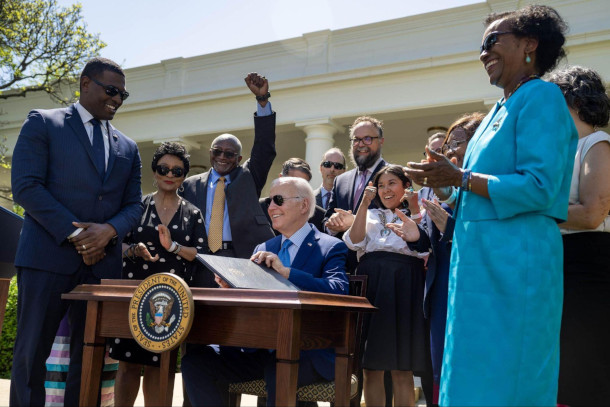
The law rescinds funding environmental justice communities had received under President Biden’s Inflation Reduction Act. Above, President Biden signs Executive Order, “Revitalizing Our Nation’s Commitment to Environmental Justice for All”, Friday, April 21, 2023. (Photo: The White House, Wikimedia Commons, Public Domain)
LAVELLE: It erases the history of these communities.
LOEB: Exactly.
CURWOOD: Some would say, and recent events have really underscored this, that this is no ordinary time to be using tax and spend provisions to deal with a crisis like the climate crisis we face right now. Vernon, Marianne, what kind of trouble do you think this legislation is going to get us in vis a vis the climate? I mean, what happens to emissions and what happens to protections for people from the ravages of these storms and floods and fires and such?
LAVELLE: So the bill is expected to contribute an additional 470 million metric tons of greenhouse gas emissions per year by 2035, and that's the equivalent of 100 million gas powered cars per year. We're going to be far from our goal of cutting emissions in half by 2030 and getting down to net zero by mid century. So this really takes away our ability to eliminate emissions on the time frame we need. Most people say wind and solar, they are pretty mature industries at this point. They're still going to happen, but they're not going to happen with the speed that we need to address the climate crisis.
LOEB: And as we continue to pour hundreds of millions of tons of carbon into the atmosphere, we're going to see more of the kind of flooding that we saw last weekend in Texas and North Carolina. We just saw historic wildfires in Los Angeles, and a lot of people fear a really bad fire season coming on. So as we fall farther and farther behind on our emissions goals as a planet and as a country, we're going to see more and more of this extreme weather become a daily fact of our lives.
[MUSIC: David Hazeltine, “I’ll Let You Know” on The New Classic Trio, Sharp Nine Records]
O’NEILL: We’re speaking with Vernon Loeb, Executive Editor, and Marianne Lavelle, Washington Bureau Chief both with our media partner Inside Climate News. We’ll be back in just a moment after we take a short break. Stay tuned to Living on Earth.
[MUSIC: David Hazeltine, “I’ll Let You Know” on The New Classic Trio, Sharp Nine Records]
ANNOUNCER: Support for Living on Earth comes from the Waverley Street Foundation, working to cultivate a healing planet with community-led programs for better food, healthy farmlands, and smarter building, energy and businesses.
[CUTAWAY MUSIC: David Hazeltine, “I’ll Let You Know” on The New Classic Trio, Sharp Nine Records]
O’NEILL: It’s Living on Earth, I’m Aynsley O’Neill.
CURWOOD: And I’m Steve Curwood.
And we’re back now with our colleagues from Inside Climate News, Executive Editor Vernon Loeb and Washington Bureau Chief Marianne Lavelle. We’ve been talking about the consequences for the climate, environment, and our democracy that come from the major tax and spending package signed into law on July 4th by President Trump.

The passage of this law is expected to add 470 million metric tons of carbon dioxide to the atmosphere per year, the equivalent of 100 million gas powered vehicles on the road annually. (Photo: Prayitno from Los Angeles, USA, Wikimedia Commons, CC BY 2.0)
O’NEILL: And as I think on this bill, something that stands out to me is that a number of the clean energy initiatives that were happening under the Inflation Reduction Act were specifically going to Republican states, Republican districts. And when this bill was on the table, a lot of Republican members of Congress were first standing up for clean energy tax credits, but then ultimately caved, huh, Marianne?
LAVELLE: Yeah, so many of the Biden administration folks, when they were leaving office, said that their clean energy policy will really be bulletproof against a political backlash, because it benefits Republican states and Republican districts so much, what happened was there was some pushback, but when push came to shove, those members, even those who voiced concern about getting rid of all of these incentives, they looked at what it would mean in their districts if they went up against President Trump, and they felt they would pay a very high political price for that. It would be worse than the price they pay for this bill, which will cut off future jobs in their districts.
O'NEILL: Now Marianne, there's something like 800 plus pages, and I'm hoping that somewhere we might be able to find some sort of silver lining, some sort of positive thing for the environment. So what if anything was able to be negotiated while this bill was making its way through the house and through the Senate?
LAVELLE: Well, there were a couple of things that even Republicans in Congress stood in front of and didn't allow to happen. One of the big things was there was an effort to put in this bill the sell off of millions of acres of public lands across 11 western states, and even the Western Republicans said, no, we're not going to allow that to happen. Nevertheless, there were huge cuts to funding of the agencies that are stewards of that land, like the National Park Service. Another thing that happened very late in the Senate negotiations on this bill is someone slapped an actual tax on wind and solar, and that was negotiated out of the bill at the very last minute, and some of the Republicans from states that have a lot of renewable energy insisted that wind and solar projects get kind of a year grace period if they can get started their project within 12 months of this bill's passage, their tax credits will still be there. But anyone else, your tax credits are going to expire very quickly in 2027 and the analysts who have looked at that believe that that's going to eliminate at least a third of the wind and solar and renewable energy development that we were going to see over the next few years.
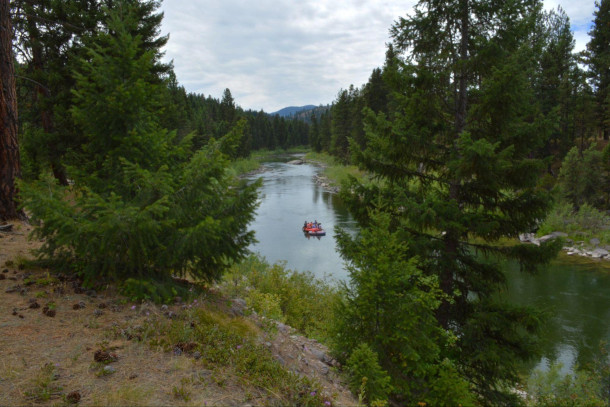
A proposal to sell off millions of acres of public lands in 11 western states was ultimately removed from the final bill. Shown above is Blackfoot River, Montana. (Photo: mypubliclands, Wikimedia Commons, public domain)
CURWOOD: What's happened to the legislative process here? It seems that the filibuster, which used to mean that a sizeable minority of people could stop things that they thought were fairly objectionable, has gone out the window. I mean, in this bill, for example, Trump got to push through a hike in the debt limit for the country by trillions of dollars, subject on just a 51-vote margin. What's happened to the democratic process in legislation now?
LAVELLE: Right. Whether or not you like the filibuster, the point of it was to bring the members of Congress together, to bring both parties together, and to come up with legislation that really represents a good amount of the views of the country that really kind of getting over that partisanship. Now for many years, some of the biggest policy measures have been passed through this special kind of legislation called budget reconciliation, which allows them to get past the filibuster, really sidestep it, and as a result, all of these big policy measures on climate as well as on health care, the tax cuts, all are being passed through these budget reconciliation bills to an extent we haven't seen before. So it really reinforces that polarization and reinforces the idea that we don't have a consensus or a shared really view of the direction of the country, and what we see in the future is just see sawing back and forth between these two highly polarized views.
O'NEILL: And Vernon and Marianne, with all this happening at the highest level of federal government, what do you see as the practical way to push back against a law like this for the sake of climate action and environmental protection?

Marianne Lavelle is the Washington Bureau Chief for our media partner, Inside Climate News. (Photo: Courtesy of Marianne Lavelle)
LOEB: Well, politically, I think, you know, all eyes are on the 2026 midterms. The Democrats need, I think, a swing of only three seats in the house to take control of the House, and they need four seats in the Senate, and I think their prospects are more difficult in the Senate, but certainly not impossible. Trump's approval ratings are at historic lows right now for a first-year President, around 40%. So to realign in some fundamental sense, it's going to be democracy, and democracy is something we talk a lot about now as we seem to be heading toward a more authoritarian future. So we shall see in two years. In the meantime, you know, the battles go on in the courts, which it's pretty mixed bag so far. Trump has lost a lot of decisions, many of which he hasn't paid attention to. The Supreme Court seems pretty friendly to Trump, and I think he sees, ultimately, the Supreme Court as an ally. And we're seeing increasingly groups of scientists and former government officials coming together outside of government to try to keep track of the things they were doing inside of government, and at the very least sound the alarm. Marianne was telling me the other day about how a group of environmental justice officials from the Trump administration have now gotten together and formed a sort of private council to keep emphasis on environmental justice and what these communities in this country are owed.
LAVELLE: Right, this is all part of the backlash we're seeing from this really extreme policy agenda that the Trump administration has gone forward with, including in this bill, and in that backlash, there is hope.

Vernon Loeb is Executive Editor for our media partner, Inside Climate News. (Photo: Courtesy of Vernon Loeb)
CURWOOD: Well, I want to thank you for taking the time with us today. Vernon Loeb is the Executive Editor of our media partner Inside Climate News.
LOEB: Great to be with you, Steve.
O'NEILL: And thank you, Marianne Lavelle, who is the Washington Bureau Head for Inside Climate News.
LAVELLE: Thanks so much. Glad to be here.
Links
Inside Climate News | “‘Big Beautiful Bill’ Set to Slash Through U.S. Climate and Justice Drive”
Living on Earth wants to hear from you!
Living on Earth
62 Calef Highway, Suite 212
Lee, NH 03861
Telephone: 617-287-4121
E-mail: comments@loe.org
Newsletter [Click here]
Donate to Living on Earth!
Living on Earth is an independent media program and relies entirely on contributions from listeners and institutions supporting public service. Please donate now to preserve an independent environmental voice.
NewsletterLiving on Earth offers a weekly delivery of the show's rundown to your mailbox. Sign up for our newsletter today!
 Sailors For The Sea: Be the change you want to sea.
Sailors For The Sea: Be the change you want to sea.
 The Grantham Foundation for the Protection of the Environment: Committed to protecting and improving the health of the global environment.
The Grantham Foundation for the Protection of the Environment: Committed to protecting and improving the health of the global environment.
 Contribute to Living on Earth and receive, as our gift to you, an archival print of one of Mark Seth Lender's extraordinary wildlife photographs. Follow the link to see Mark's current collection of photographs.
Contribute to Living on Earth and receive, as our gift to you, an archival print of one of Mark Seth Lender's extraordinary wildlife photographs. Follow the link to see Mark's current collection of photographs.
 Buy a signed copy of Mark Seth Lender's book Smeagull the Seagull & support Living on Earth
Buy a signed copy of Mark Seth Lender's book Smeagull the Seagull & support Living on Earth

